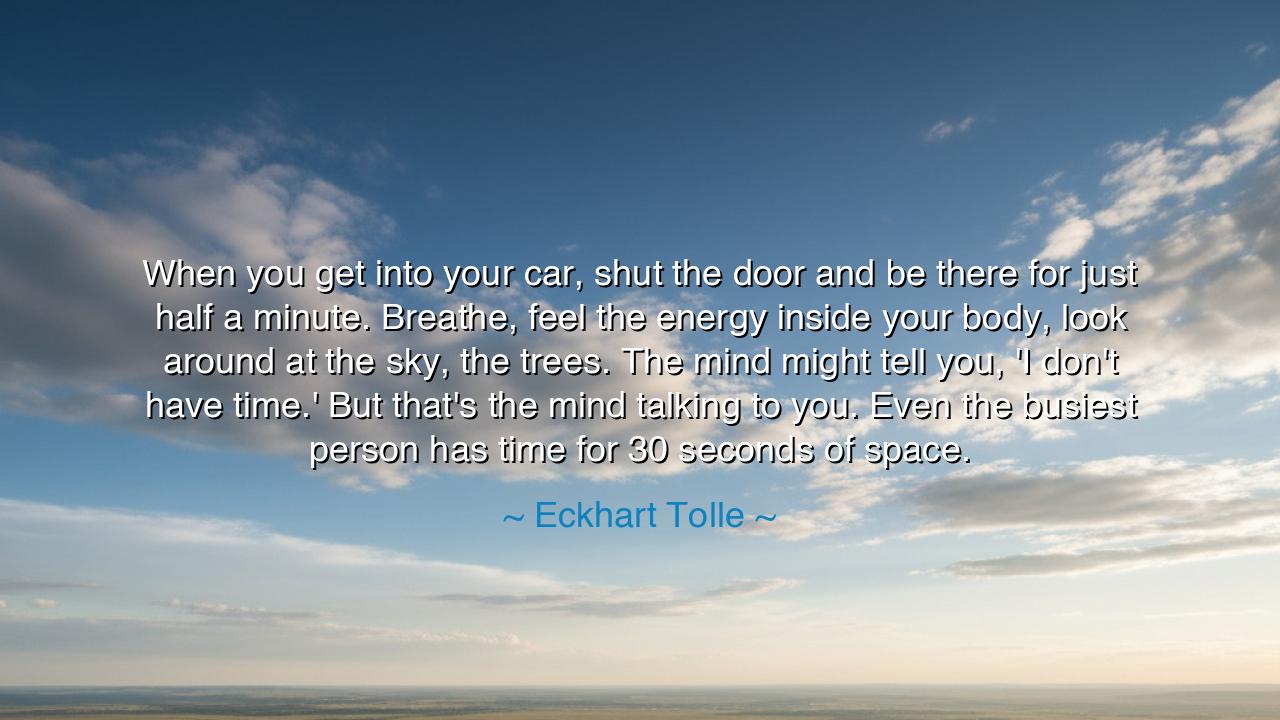
When you get into your car, shut the door and be there for just
When you get into your car, shut the door and be there for just half a minute. Breathe, feel the energy inside your body, look around at the sky, the trees. The mind might tell you, 'I don't have time.' But that's the mind talking to you. Even the busiest person has time for 30 seconds of space.






Hear the quiet yet thunderous wisdom of Eckhart Tolle, who counsels: “When you get into your car, shut the door and be there for just half a minute. Breathe, feel the energy inside your body, look around at the sky, the trees. The mind might tell you, ‘I don’t have time.’ But that’s the mind talking to you. Even the busiest person has time for 30 seconds of space.” This saying is no small instruction about cars or seconds—it is a doorway into the eternal, a reminder that space and presence are always within reach, no matter how rushed the world may seem.
The origin of these words lies in Tolle’s teachings on mindfulness and presence. He has long urged humanity to awaken from the tyranny of the mind, to cease being slaves to thought and constant motion. In this quote, he reveals a simple practice: to pause, even for half a minute, to reconnect with the body, with the breath, with the sky, with the trees. By doing so, one steps out of the ceaseless demands of the mind and into the vast stillness of being. What seems like a trivial moment is, in truth, a return to eternity.
Consider the story of the emperor Marcus Aurelius. Burdened with the cares of ruling Rome, commanding armies, and quelling unrest, he found in his Meditations moments of pause. In the midst of war and chaos, he urged himself to look upon the stars, to breathe deeply, to remind himself of the order of the cosmos. His empire was vast, his responsibilities endless, yet he still carved out moments of space to restore his soul. Tolle’s teaching is the same: even the busiest life is not too busy for stillness, for to neglect it is to lose oneself.
The brilliance of Tolle’s instruction lies in its simplicity. The mind says, “I don’t have time.” But this is a deception, for thirty seconds are always there. We waste them in worry, in impatience, in haste, yet rarely do we claim them for presence. By choosing to use them wisely—to breathe, to feel, to see—we transform those seconds into treasures. A single conscious breath can calm storms, a brief glance at the sky can awaken wonder, a pause can shift the course of an entire day.
The deeper meaning of his words is this: freedom is not found in adding more hours, but in reclaiming the smallest of moments. The chains that bind us are not of time itself, but of our mind’s ceaseless noise. When we step aside from that noise, even briefly, we taste eternity. Thus, Tolle reminds us that peace is never far away; it is as close as the next breath, as near as the trees outside the window, as immediate as the space between thoughts.
The lesson for us is powerful: no one is too busy for presence. Kings, soldiers, workers, mothers, all can pause for thirty seconds. If you believe you cannot, then it is not the world that binds you but your own mind. In reclaiming these moments, you reclaim yourself. You step out of the river of anxiety and onto the shore of being, where clarity and strength arise.
So take this teaching into your daily life: when you sit in your car, or at your desk, or before your meal, pause. Breathe. Look upon the world with fresh eyes. Let thirty seconds of space be your temple, your sanctuary, your renewal. For in these brief pauses lies the secret of balance, the seed of peace, and the reminder that life’s true power is not in rushing forward, but in dwelling fully in the present.






AAdministratorAdministrator
Welcome, honored guests. Please leave a comment, we will respond soon